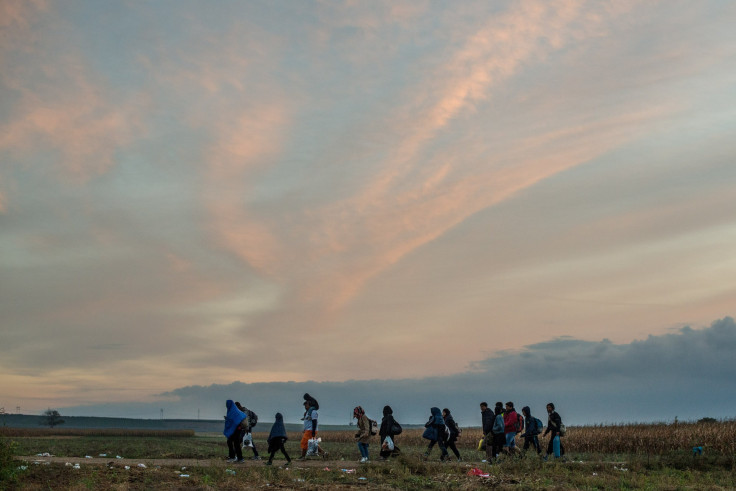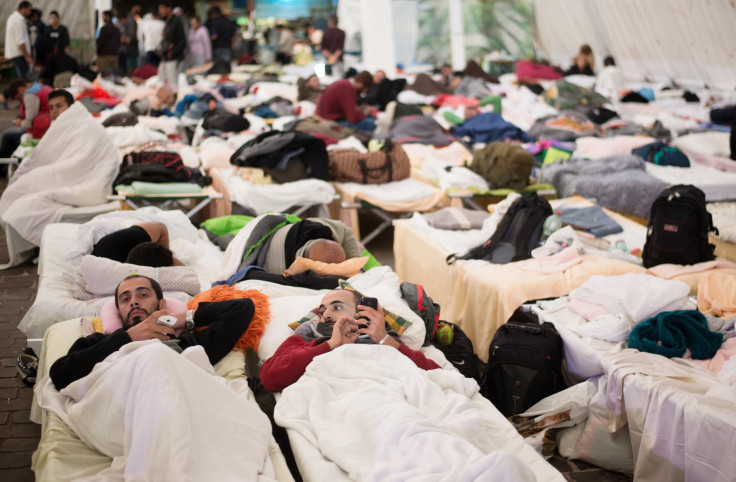EU Refugee Crisis In Austria: Influx Of Thousands Could Solve Slowing Economic Growth, Analysts Say

Refugees continued to surge into Austria by the thousands Monday after a record-breaking weekend, drawn to a country that has historically escaped multiple European economic crises unscathed and maintained strong growth paralleled only by neighboring Germany. But with fewer babies born and a pension system that allows citizens to retire as young as 60 with extensive benefits, economists have warned that the current social system in Austria is not sustainable. A massive refugee population arriving to Europe could be exactly what the country needs to keep its economy on track, said analysts, citing the need to inject Austria with a new, young workforce.
Tens of thousands of some 500,000 asylum-seekers who have arrived in Europe since January -- more than half of them fleeing war-torn Syria -- said they wanted to make their homes in Austria, a country known for its ample employment opportunities. Following Austria's quick bounce-back from a 2008 European recession that sunk the euro and sent several countries into severe debt, local media dubbed the nation "the better Germany," for its unusually high growth rate and rapid recovery.
"It's known that once you get to Austria, you've arrived," said one 23-year-old refugee, the Local reported Monday.
In the past year, however, Austria’s economy has been poised for a slump, according to several fiscal indicators. Unemployment remained low throughout the 2008 crisis and is currently at 5.6 percent, though that number is a spike from a rate closer to 4 percent in 2008, and unemployment is projected to continue climbing.
The European Commission projected in May that the nation would see only 0.8 percent GDP growth in 2015, far below the current EU average of 1.5 percent. “Austria is confronted with a long-term structural change,” Ewald Nowotny, president of the Bank of Austria, told journalists at a press conference following the commission’s dire predictions in May. “The challenge lies in coming up with areas that can bring us back to a promising path,” he said.
Industry rejuvenation is one potential solution, but the nation’s demographics point to a decline in working-age people and a growing population set to retire. Austria's birth rate was 9.41 births per 1,000 people in 2014, one of the lowest in the world. The government has moved to extend the retirement age to at least 65 for everyone, though that change might not be in place until 2030.

Initial costs of integrating refugees into housing, schools and industries are high -- usually in the multi-millions -- and Austria has already struggled to provide adequate food and shelter to new arrivals. However, the long-term gains of immigrant populations can far outweigh the initial resource drain. People living with foreign passports in neighboring Germany, for instance, paid on average $4,127 more on taxes than they received in social security benefits, Fortune magazine reported. This net gain translated to a $22 billion surplus collected in taxes paid by immigrants alone. German authorities estimated that the most recent influx of Syrian refugees could grow the economy by an additional 1.7 percent by 2020.
For another example, 40 percent of the largest companies in the United States were started by immigrants or the children of immigrants, and the same entrepreneurial spirit could invigorate Europe, according to a report in Forbes magazine.
Additionally, Syrian immigrants on average come from wealthier and more educated backgrounds than many other refugee populations worldwide. They often have advanced degrees, language skills and are more likely to come from professional rather than agrarian backgrounds, aid workers have reported.
Refugees could do as much for Europe as Europe could do for them, European Commission president Jean-Claude Juncker told member-states during an address earlier in September. “Let us not forget, we are an aging continent in demographic decline," he said.
© Copyright IBTimes 2024. All rights reserved.












